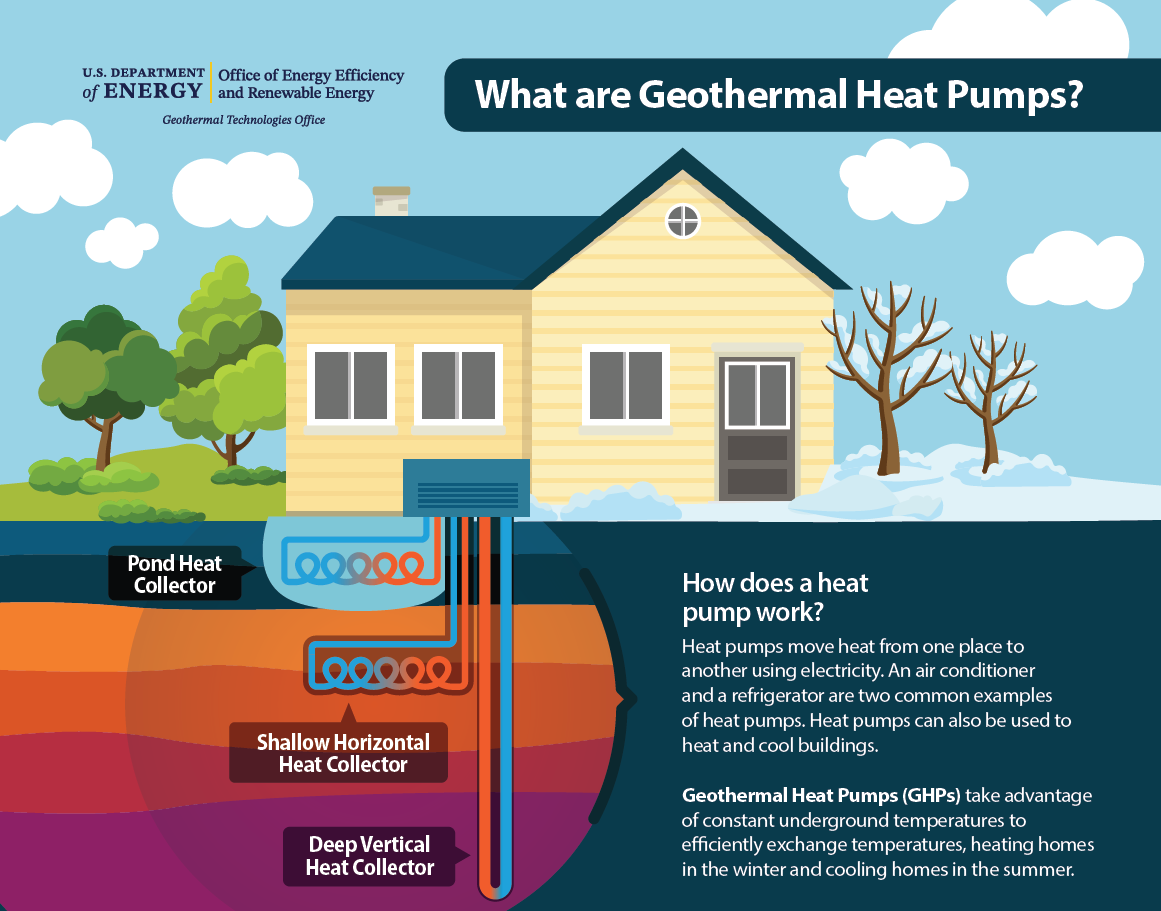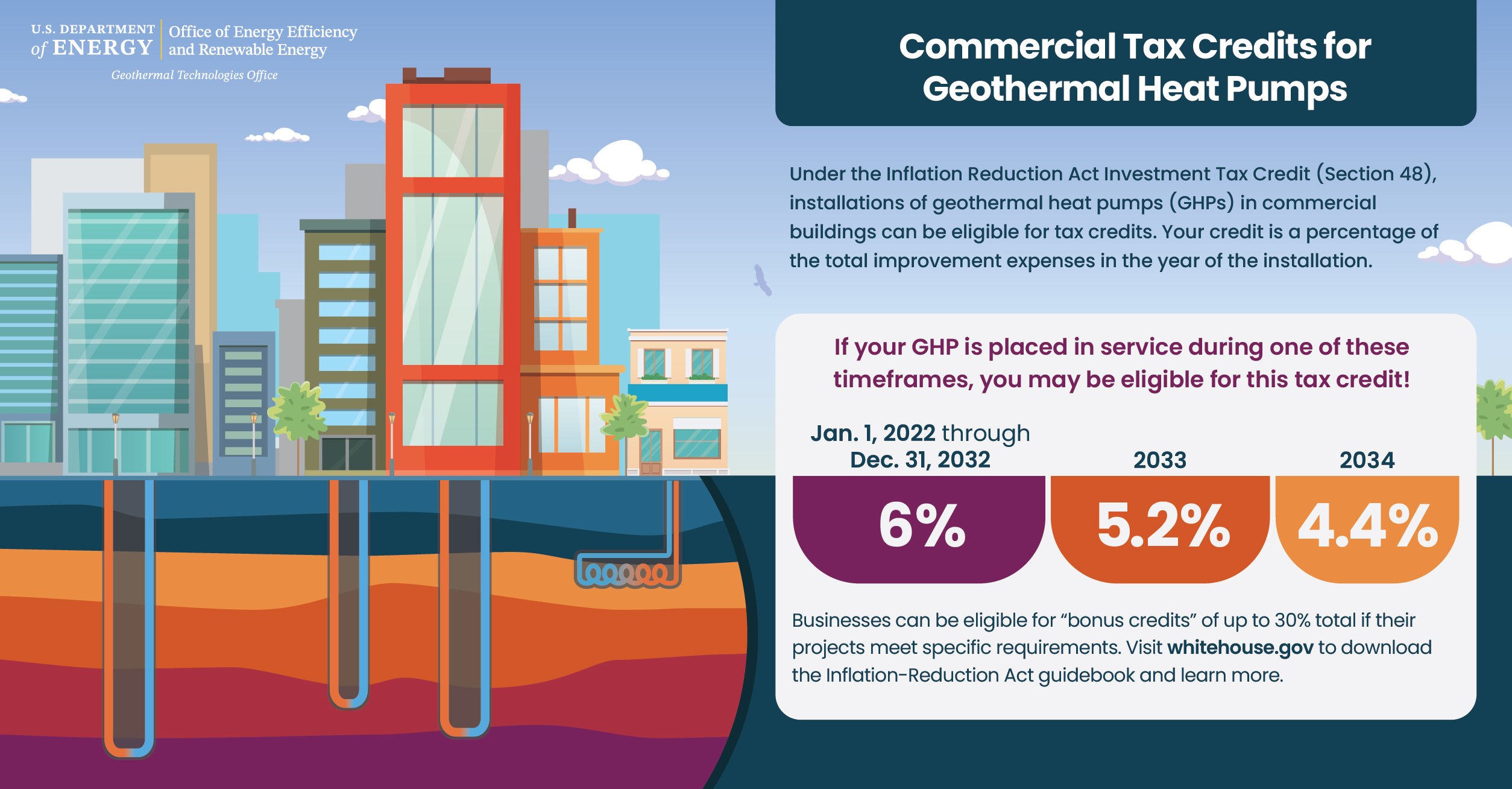Geothermal heat pumps (GHPs), also known as ground source heat pumps (GSHPs) use the relatively constant temperatures found in the subsurface to warm indoor air in winter and cool it in the summer. Because these constant temperatures can be found nationwide, these systems offer an efficient option to heat and cool homes, businesses, and other buildings in all 50 U.S. states.
GHPs can be added to existing buildings, and tax credits and other financial assistance can make new or retrofitted GHPs more affordable.

Visit the U.S. Department of Energy’s (DOE) Energy Saver Geothermal Heat Pump page for an overview of how geothermal heat pumps work and what the different kinds of GHPs are.
Want a quick guide on how GHPs work?
Download GTO's fact sheet.
The One Big Beautiful Bill Act (P.L. 119-21), enacted on July 4, 2025, revised dates and provisions in the Internal Revenue Code that affect some or all of the tax credits described below. Though these pages should not be considered tax advice, they are subject to change as more information becomes available. For additional information, please see Treasury.gov or IRS.gov.
Information on Installing Geothermal Heat Pumps
To assess whether your home or business meets the characteristics for installing a geothermal heat pump, contact a geothermal designer (instead of an installer) or a local professional engineer.
The International Ground Source Heat Pump Association and Geothermal Exchange Organization offer searchable directories of designers, installers, and other professionals who can assist you. You can also contact your state energy office or do an internet search for “geothermal heat pump designers/installers in (state)” or something similar.
Homeowner Information
Energy Assistance for Low-Income Homeowners
Homeowners who qualify as low income can receive help with home energy bills, weatherization, and energy-related home repairs. These programs are administered by the states.
Visit the following sites to learn about eligibility and how to apply for assistance:
- DOE’s Weatherization Assistance Program, which provides assistance with home improvements to improve the efficiency, comfort, health, and safety of homes.
- U.S. Department of Health & Human Services’ Home Energy Assistance Program, which provides assistance with paying home energy bills.
Commercial (Business) Information
Federal tax credits and assistance are intended to encourage upgrading or planning for geothermal heat pump systems in commercial buildings.
A tax professional or local installer can provide more information about specific project eligibility and credits.
The One Big Beautiful Bill Act (P.L. 119-21), enacted on July 4, 2025, contains several provisions on energy tax credits. For additional information about how the One Big Beautiful Bill Act has changed various energy tax provisions please refer to Treasury.gov or IRS.gov.
Commercial Tax Credits for Geothermal Heat Pumps

Commercial building owners interested in installing GHPs are eligible for tax credits under the Investment Tax Credit (ITC, Section 48). The base tax credit is 6%, scaling to 5.2% in 2033 and 4.4% in 2034. Businesses are eligible for “bonus credits” of up to 30% total if their projects meet specific prevailing wage, domestic content, or energy community requirements. View the Internal Revenue Service's Advanced Energy Project Credit page for more information.
Energy Assistance for Agricultural Producers and Rural Small Businesses
Agricultural producers or rural small businesses can consider the U.S. Department of Agriculture’s Rural Energy for America Program, which provides guaranteed loan financing and grant funding for renewable energy systems or energy-efficiency improvements.
Local, Utility, and Community Technical Assistance
Local governments, electric utilities, community-based organizations, and others can also apply for 40–60 hours of free technical assistance from DOE’s national laboratory experts on questions related to GHPs via Expert Match, part of DOE’s Energy to Communities program.
Additional Resources
To search for state-level renewable energy incentives, including tax credits, grants, and rebates, visit:
- The Database of State Incentives for Renewables and Efficiency, which provides a centralized resource for renewable energy and energy-efficiency policies and incentives. You can search by state or use the USA Summary Tables page to filter for geothermal heat pumps (in the Technology dropdown menu).
- DOE’s State Energy Offices and Organizations page, which provides links for each state’s energy office.
To learn more about how geothermal energy can support your local energy goals, visit our Community Engagement and Engagement with Tribal and Native Communities pages. Additional resources such as technical assistance, grants, vouchers and other initiatives can be found on the Opportunities for Communities page.
Check with your local utility, regional energy organizations, and installers to learn about available energy efficiency and other incentives in your area.
The Office of Geothermal's Work to Expand the Use of Geothermal Energy
The mission of DOE's Office of Geothermal (OG) is to increase geothermal energy deployment through research, development, and demonstration (RD&D) of innovative technologies that enhance exploration and production.
This office is an applied research organization that manages portfolios of RD&D projects selected through competitive funding solicitations.
In partnership with industry, academia, and DOE’s national laboratories, OG works to expand geothermal development by funding activities in four areas:
- Enhanced Geothermal Systems
- Hydrothermal Resources
- Low Temperature & Coproduced Resources (including GHPs)
- Data, Modeling, and Analysis
You can learn more about how OG funds research on our Geothermal Basics page and Open Funding Opportunities page.

